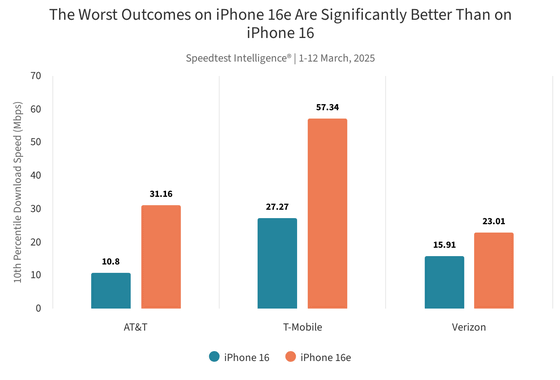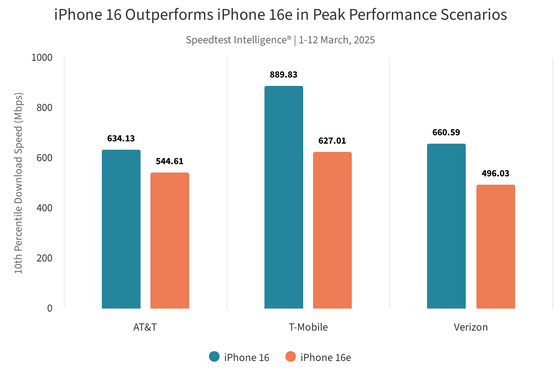Apple's first 5G modem chip 'C1' outperforms Qualcomm's 5G modems in multiple benchmarks

The
A First Look at How Apple's C1 Modem Performs With Early Adopters | Ookla®
https://www.ookla.com/articles/apples-c1-modem-early-adopters

Apple's C1 outperforms iPhone 16 with Qualcomm in most benchmarks - 9to5Mac
https://9to5mac.com/2025/03/19/apples-c1-outperforms-iphone-16-with-qualcomm-in-most-benchmarks/
The iPhone 16/16 Plus/16 Pro/16 Pro Max released in October 2024 is equipped with a Qualcomm 5G modem chip as before, but the iPhone 16e released in February 2025 is equipped with Apple's first proprietary 5G modem chip, the C1. The difference between the C1 and Qualcomm's 5G modem chip is that the C1 does not support millimeter wave .

Ookla compared the mobile communication performance of the iPhone 16e and iPhone 16 for 12 days from March 1 to 12, 2025, and compared the performance of the C1 and Qualcomm 5G modem chips. Both the iPhone 16e and iPhone 16 have the
Ookla analyzed data from Speedtest Intelligence , a company that provides analysis of mobile communication performance data, from iPhone 16 and iPhone 16e users who use the networks of major US carriers AT&T, Verizon, and T-Mobile.
Comparing the data for the top 90 percentile of users (those who experienced the best performance), the download speed for the iPhone 16 was 756.13 Mbps, while the iPhone 16e was 560.4 Mbps. However, for the top 10 percentile (those who experienced the worst performance), the iPhone 16e (27.35 Mbps) recorded a better download speed than the iPhone 16 (16.66 Mbps). The median download speed for the iPhone 16e (217.64 Mbps) was also higher than that of the iPhone 16 (210.55 Mbps).

The average download speeds by carrier are as follows. Despite not supporting mmWave, the iPhone 16e recorded faster average download speeds than the iPhone 16 on both AT&T and Verizon networks. On the other hand, iPhone 16e users recorded significantly slower download speeds on T-Mobile's network. iPhone 16e users had an average download speed of 264.71 Mbps when using T-Mobile, 140.77 Mbps when using Verizon, and 226.90 Mbps when using AT&T. Comparing the average download speed of T-Mobile users using the iPhone 16e (264.71 Mbps) with the average download speed of T-Mobile users using the iPhone 16 (357.47 Mbps), the iPhone 16 was 24% faster than the iPhone 16e.

Regarding why the average download speed of the iPhone 16e is inferior to that of the iPhone 16 only on the T-Mobile network, Ookla explains, 'T-Mobile is the only carrier in the United States with a nationwide commercialized 5G standalone network (SA), and is likely one of the few carriers in the world that deploys significant spectrum depth and advanced features such as carrier aggregation on the new 5G architecture. The limited capabilities of the C1 modem in the 5G SA network compared to the Qualcomm modem in the iPhone 16 may be the main factor behind the large performance gap observed on the T-Mobile network in this analysis.'
In addition, the following graph summarizes the average download speeds for the 10th percentile (users who experienced the lowest performance) by carrier. The iPhone 16e recorded an average download speed that exceeded the iPhone 16 for all three carriers.

Conversely, the following graph summarizes the average 90th percentile (users who experienced the best performance) of download speeds by carrier. For users who are able to experience high-speed communication, the iPhone 16 recorded faster average download speeds across all carriers.

Ookla noted that '10th percentile performance often reflects the overall communications experience more accurately than 90th percentile performance, which may be skewed by deployment in mmWave coverage areas.'
9to5Mac, an Apple-related media outlet, pointed out that 'Ookla's analysis data shows that Apple's C1 modem will compete on par with or even surpass market leader Qualcomm's modem chips.'
Related Posts:







